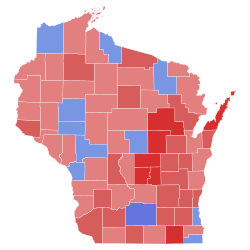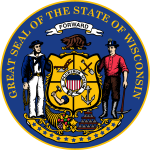
Alexander Wiley was an American politician who served four terms in the United States Senate for the state of Wisconsin from 1939 to 1963. When he left the Senate, he was its most senior Republican member.

The 1964 United States Senate elections were held on November 3. The 33 seats of Class 1 were contested in regular elections. Special elections were also held to fill vacancies. They coincided with the election of President Lyndon B. Johnson by an overwhelming majority, to a full term. His Democratic Party picked up a net two seats from the Republicans. As of 2023, this was the last time either party has had a two-thirds majority in the Senate, which would have hypothetically allowed the Senate Democrats to override a veto, propose constitutional amendments, or convict and expel certain officials without any votes from Senate Republicans. In practice, however, internal divisions effectively prevented the Democrats from doing so. The Senate election cycle coincided with Democratic gains in the House in the same year.

The 1962 United States Senate elections was an election for the United States Senate. Held on November 6, the 34 seats of Class 3 were contested in regular elections. Special elections were also held to fill vacancies. They occurred in the middle of President John F. Kennedy's term. His Democratic Party made a net gain of four seats from the Republicans, increasing their control of the Senate to 68–32. However, this was reduced to 67–33 between the election and the next Congress, as on November 18, 1962, Democrat Dennis Chávez, who was not up for election that year, died. He was replaced on November 30, 1962, by Republican appointee Edwin L. Mechem. Additionally, Democrat Strom Thurmond became a Republican in 1964, further reducing Democrats to 66–34. This was the first time since 1932 that Democrats gained seats in this class of Senators.
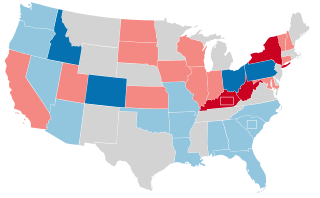
The 1956 United States Senate elections were elections for the United States Senate that coincided with the re-election of President Dwight D. Eisenhower. The 32 seats of Class 3 were contested in regular elections, and three special elections were held to fill vacancies. Although Democrats gained two seats in regular elections, the Republicans gained two seats in special elections, leaving the party balance of the chamber unchanged.

Thomas Edward Fairchild was an American lawyer and judge. He served forty years as a judge of the United States Court of Appeals for the Seventh Circuit. Earlier in his career he was a justice of the Wisconsin Supreme Court, United States Attorney for the Western District of Wisconsin, and the 31st Attorney General of Wisconsin.

The 1944 United States Senate election in Wisconsin was held on November 7, 1944. Incumbent Republican U.S. Senator Alexander Wiley was re-elected to a second term in office over Howard J. McMurray and Harry Sauthoff. Future Senator Joseph McCarthy challenged Wiley in the Republican primary.

The 1962 United States Senate election in Wisconsin was held on November 6, 1962. Incumbent Republican U.S. Senator Alexander Wiley ran for re-election to a fifth term in office but was defeated by Democratic Governor Gaylord A. Nelson.
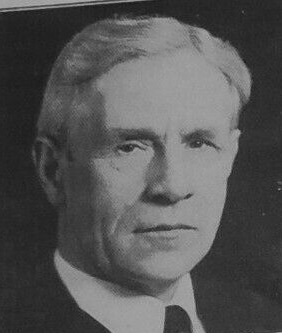
The 1938 United States Senate election in Wisconsin was held on November 8, 1938. Incumbent Democratic U.S. Senator F. Ryan Duffy ran for a second term in office. In a three way race, Alexander Wiley defeated Duffy and Lieutenant Governor Herman L. Ekern.

The 1956 United States Senate election in Wisconsin was held on November 6, 1956. Incumbent Republican U.S. Senator Alexander Wiley was re-elected to a fourth term in office. He survived a close primary challenge from U.S. Representative Glenn R. Davis before defeating Henry Maier in the general election. This election marks the last Senate election in Wisconsin to date in which the Republican candidate won Milwaukee County.

The 1952 United States Senate election in Wisconsin was held on November 4, 1952.

The 1950 United States Senate election in Missouri took place on November 7, 1950 in Missouri. Incumbent Republican Senator Forrest C. Donnell ran for a second term in office but was defeated by Democratic nominee Thomas C. Hennings Jr.

The 1950 United States Senate election in Iowa took place on November 7, 1950. Incumbent Republican Senator Bourke B. Hickenlooper was re-elected to a second term in office over Democratic U.S. Undersecretary of Agriculture Albert J. Loveland.
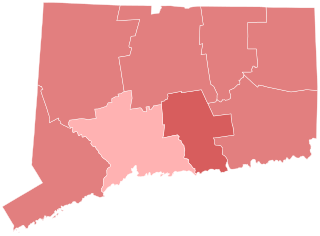
The 1922 United States Senate election in Connecticut was held on November 7, 1922. Incumbent Republican Senator George P. McLean was re-elected to a third term in office over Democratic attorney Thomas J. Spellacy.

The 1926 United States Senate election in Wisconsin was held on November 2, 1926. Incumbent Senator Irvine Lenroot ran for a second term in office but lost the Republican primary to Governor John J. Blaine. Blaine won the general election over Democratic nominee Thomas Kearney and Socialist Leo Krzycki; his primary opposition, however, came from independent Republican candidate Charles D. Rosa.

The 1930 United States Senate election in Michigan was held on November 4, 1930. Incumbent Republican U.S. Senator James J. Couzens was re-elected to a second term in office over Democratic former U.S. Representative Thomas A. E. Weadock.
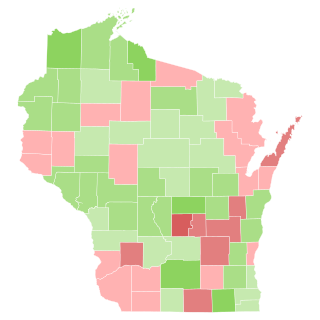
The 1940 United States Senate election in Wisconsin was held on November 5, 1940.

The 1944 United States Senate election in Connecticut was held on November 7, 1944.

The 1972 United States Senate election in Michigan was held on November 7, 1972. Incumbent Republican U.S. Senator and Senate Minority Whip Robert P. Griffin ran for re-election to a second term, won reelection defeating the Democratic candidate, and Michigan Attorney General Frank J. Kelley by 6%. Despite President Richard Nixon’s landslide victory in Michigan and the rest of the country, Griffin’s margin of victory decreased from the previous election.
The 1948 Massachusetts general election was held on November 2, 1948, throughout Massachusetts. Primary elections took place on September 14.
The 1946 Massachusetts general election was held on November 5, 1946, throughout Massachusetts. Primary elections took place on June 18.
